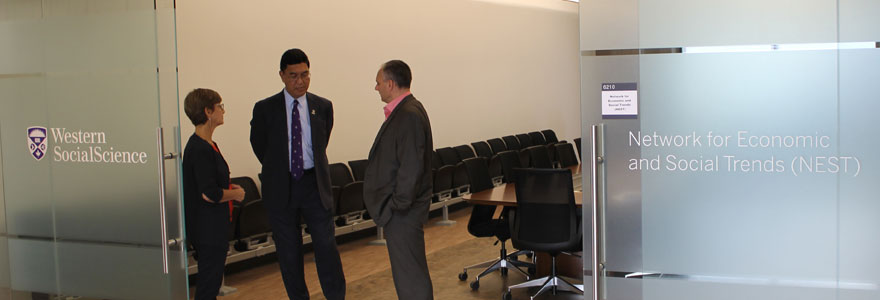News and Updates
Contact
Faculty of Social Science
Social Science Centre
Room 9438
Western University
T. 519-661-2053
F. 519-661-3868
E. social-science@uwo.ca
NEST opens doors to incubate new ideas in social science research and policy
October 01, 2018
Modern societies are experiencing unprecedented social and economic changes, including a slowdown in economic growth, rising inequality, and increasing ethnic diversity and geographic mobility.
The unprecedented changes call for a new approach, and new solutions.
On September 28, the Faculty of Social Science celebrated the opening of the Network for Economic and Social Trends (NEST).
NEST, the flagship research and policy alliance in the Faculty of Social Science at Western University, addresses these challenges by conducting world-class multidisciplinary research, fostering national and international collaborations, and facilitating the training of the next generation of leaders in academia, the private and non-profit sectors, and government.
NEST is the umbrella organization for all six Western Research Centres in the Faculty of Social Science which set its agenda and provide its governance.
Bob Andersen, Dean of the Faculty of Social Science, said he was driven to organize NEST upon seeing the research excellence of the faculty members in Social Science.
“After extensive consultation, it also became clear that we would be even stronger if we worked together,” said Andersen. “In short, we needed to remove barriers and create incentives and structures that encourage meaningful interdisciplinary collaborations. We also needed a way to promote the value of social science research.”
Victoria Esses, Professor in the Department of Psychology, is the first Director of NEST.
“By pooling our intellectual and physical resources, we will have more of an impact than any one researcher or research centre alone,” said Esses. “I look forward to the future activities and successes of NEST and to working with others interested in conducting research that makes a difference.”
“We’re already one of the best social science research centres in the country – now NEST will take us even further,” said Andersen, excited to see NEST begin working after three years of planning. “Things like economic development, prosperity, educational attainment, migration; you require effective policy to address these, and other issues. It requires rigorous empirical social science research, which is NEST.”
The six research centres are:
- The Centre for Computational and Quantitative Social Science (Director, Dave Armstrong)
- The Centre for Human Capital and Productivity (Director, Lance Lochner)
- The Centre for Research on Social Inequality (Director, Anders Holm)
- The Centre for Migration and Ethnic Relations (Director, Victoria Esses)
- The Centre for Transitional Justice and Post-Conflict Reconstruction (Director, Joanna Quinn)
- The Centre for Urban Policy and Local Governance (Director, Zack Taylor)
Members of NEST will apply advanced approaches to studying the changing social, political, and economic challenges facing Canada and the rest of the world.
Speaking at the launch, Western University President Amit Chakma spoke about the importance of collaborative research, as a way to strengthen the reputation of the university.
“By promoting our initiatives and forging partnerships both inside and outside Western, NEST will increase our research profile, both in the international academic community and with policy makers,” said Andersen. “In short, our goal is to make a difference.”

